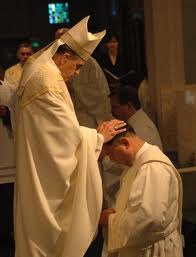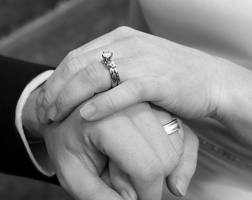A (Long) Open Letter to my friends at Dignity/Washington
Dear Friends,
This evening, a Dignity/Washington “Task Force considering the issue of Women Presiders at Mass will facilitate a 1-hour community dialogue … to express thoughts and opinions on this issue.”
 For many years, D/W was my spiritual home, a place where I was privileged, along with other LGBT Catholics, “our family and friends,” to gather regularly for the celebration of Eucharist. As I am not able to be present for this community dialogue, I’d like to do the next best thing. I’d like to say from afar what I wish I could say in person. So, I am putting in writing my thoughts and ideas on this fundamentally significant issue. I say it’s “fundamentally significant” because, for us as Catholics, the Eucharist is the “source and summit” of our lives as Christians. That phrase from the Second Vatican Council (Lumen Gentium, ch. II) reminds us that it is most clearly in the public celebration of Eucharist that we tell the world who we claim to be, and that we are united with all of our sisters and brothers throughout the world and even across the centuries who share this same apostolic faith. It continues to be a truism that any Catholic can go into a Catholic church anywhere in the world and join in the Eucharistic celebration — even if that celebration is in a different language and an entirely different culture — and still feel very much “at home.”
For many years, D/W was my spiritual home, a place where I was privileged, along with other LGBT Catholics, “our family and friends,” to gather regularly for the celebration of Eucharist. As I am not able to be present for this community dialogue, I’d like to do the next best thing. I’d like to say from afar what I wish I could say in person. So, I am putting in writing my thoughts and ideas on this fundamentally significant issue. I say it’s “fundamentally significant” because, for us as Catholics, the Eucharist is the “source and summit” of our lives as Christians. That phrase from the Second Vatican Council (Lumen Gentium, ch. II) reminds us that it is most clearly in the public celebration of Eucharist that we tell the world who we claim to be, and that we are united with all of our sisters and brothers throughout the world and even across the centuries who share this same apostolic faith. It continues to be a truism that any Catholic can go into a Catholic church anywhere in the world and join in the Eucharistic celebration — even if that celebration is in a different language and an entirely different culture — and still feel very much “at home.”
At the beginning of this dialogue, it’s essential to define some terms and then clarify what this discussion is really all about. Without those definitions, I contend that the conversation would be one of mere emotion and opinion, and as such, would be incomplete.
First, what does “presider” mean? In liturgical practice, a “presider” is any person who leads a community during a liturgical prayer. It is a term that has meaning precisely in the act of doing. Thus, in the Catholic context, it is a functional term only. There is no such thing as a presider outside of the act of presiding. The term should not be confused with terms referring to an office or position in the Church (such as “Pastor” or “Catechist”), nor with terms that denote one’s sacramental character. “Pastor,” for example, indicates someone who holds an official position as the leader of a local parish and “Catechist” is someone who has been designated to teach and guide those seeking full initiation into the Church (as in the RCIA process). “Baptized” and “Confirmed” and “Ordained” indicate the sacramental character of a person who has received those respective Sacraments. By way of illustration, consider the Abbess of a community of nuns who leads her religious sisters daily in praying the Liturgy of the Hours. Each time she does this, she is “presiding.” While engaged in the act of presiding at morning and evening prayer, it would be correct to say she is the Abbess and that she is functioning as the presider at those particular liturgical celebrations. Outside of those times, she would still be Abbess, which is the formal office which is hers as the leader of her community. Outside of those times of liturgical celebration, however, it would be somewhat meaningless to refer to her as “presider” because there is no “presiding” going on. Similarly, there have been many times when the D/W community has had prayer services of various types and a community member — male or female — has led that prayer. At such times, that person could properly be called “presider” because he or she was engaged in the act of presiding over the celebration. Once the act of presiding is over, one is no longer a presider.
Second, what does “Mass” mean? Mass is a term which Catholics use to refer to our primary liturgical celebration. The Mass is the celebration of the Eucharist, and the Eucharist is at the heart of the Sacramental life of the Church. One of the hallmarks of the D/W community’s celebration of Eucharist is that it has, heretofore, always adhered to the Roman Catholic Church’s norms for what is called a “valid” celebration of the Eucharist. The apostolic Christian Churches of both the East and the West have, for two millennia, recognized the importance of “validity” in celebrating the Sacraments. For example, in order for the celebration of Baptism to be valid, water must be used, along with the invocation of the Trinity. If someone were baptized simply “In the name of Almighty God,” that baptism would not be considered valid Christian Baptism, because the Holy Trinity was not invoked. For some sacraments, one essential element for validity is the “minister of the sacrament.” Catholic and Orthodox Traditions have always identified a validly ordained priest as the minister of the Eucharist. Thus, as a way of expressing its own commitment to our Catholic identity, Dignity/Washington has always celebrated Eucharist with a presider whom the Catholic Church recognizes as a validly ordained priest. (I used this phrase very deliberately, because I suspect that those who would like to see a change in D/W’s current practice would state that there are women who have been ordained as priest. It is not my purpose — nor do I think it should be D/W’s purpose — to enter the contentious discussions about the validity/invalidity of any such ordinations.) It is this fact — that D/W has always celebrated Eucharsist with a presider whom the Catholic Church recognizes as a validly ordained priest — which has allowed many leaders of the D/W community to answer in the affirmative when a visitor or potential new member has inquired, “Is this really Catholic? Is that a ‘real’ priest?” Those leaders could honestly answer, “Yes, it is really Catholic, and yes, that’s a real priest.”
It is my perspective that this practice has been the hallmark of D/W community. Were it not, I know that I and many others would never have called D/W our spiritual home, because it would have felt illegitimate to call our celebrations of Eucharist “Catholic.” While there is no doubt that many Catholics — myself included — believe that women should be admitted to ordination within the Roman Catholic Church, the sad fact is that this is currently not our Church’s practice. I wish it different — but it’s not.
It’s About Sacrament (and not sex or gender)
Catholicism takes Sacraments seriously. They are the glue which binds us together. They mark not only significant moments in our individual lives, but also have, at their very core, the Mystery of Faith which brings us into the Christian family and which nourish, strengthen, and restore us throughout our lives. Because Sacraments are so central to the life of the Universal Church, no individual community — no parish, no diocese, no religious order — has the liberty to change by their own authority the fundamental character of how the Sacraments are celebrated. To do so would, in a significant way, “break communion” with the rest of our brothers and sisters around the world with whom we are united each time we gather “in word and in sacrament” to hear the Word of God and to be nourished by the Real Presence of Christ in Eucharist.
And so, I believe that the question posed by the D/W Task Force is fundamentally not about women, no matter how strongly we feel about the inclusion of women and their many gifts in the ranks of the Church’s ordained ministers. The question IS about whether or not the D/W community wishes to continue to celebrate Eucharist with presiders whom the Catholic Church recognizes as validly ordained priests. The question IS about whether the D/W community wishes, in all honesty, to be a Catholic community and not just a “Catholic-like” community.
Pope Francis and Hope for the Future
 Most of us have been overwhelmingly surprised and pleased by the ways in which Pope Francis has made positive overtures to the LGBT community in the months since his election as the Bishop of Rome and the Successor of St. Peter. For the first time in decades, LGBT Catholics have legitimate reason to hope that the years ahead might be very, very, very different than what was imagined only a few months ago.
Most of us have been overwhelmingly surprised and pleased by the ways in which Pope Francis has made positive overtures to the LGBT community in the months since his election as the Bishop of Rome and the Successor of St. Peter. For the first time in decades, LGBT Catholics have legitimate reason to hope that the years ahead might be very, very, very different than what was imagined only a few months ago.
Until now, the D/W community can correctly state that what has separated us from the wider Church was not of our own choosing. If D/W strays from its practice of celebrating Eucharist with presiders whom the Catholic Church recognizes as validly ordained priests, that would no longer be true. The D/W community could no longer state that any distance between us and the wider Church was not of our creation. Rather, we ourselves would have taken steps to further separate ourselves from the institutional Church. A decision to move in this direction is a decision one would anticipate if D/W wished to become its own independent denomination rather than a community that proudly proclaims its status as an integral part of the Roman Catholic Church. Given the hope that fills the Church now under the leadership of Pope Francis, now is not the time to move further away from the Church we love and the Church we call home.
It is my prayer that Dignity/Washington will continue to be a place where LGBT Catholics not only are welcomed — for we are welcome in many gay-affirming Christian Churches — but that it will also continue to be a place where, through the community’s wonderfully rich, beautiful, and inspiring Eucharistic liturgies, LGBT Catholics, our family and friends, feel very, very, very much “at home”!
In God’s Peace!
Tim




